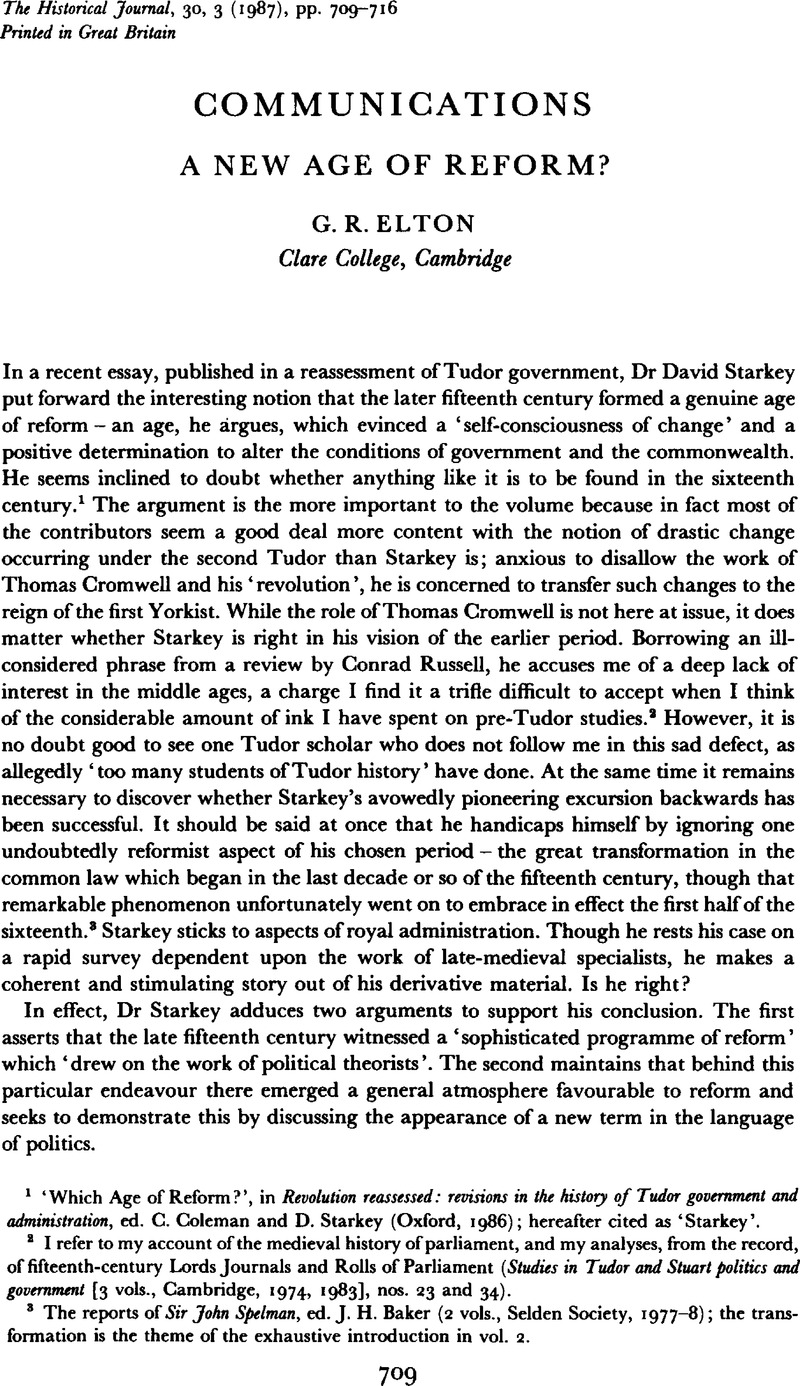No CrossRef data available.
Article contents
A New Age of Reform?
Published online by Cambridge University Press: 11 February 2009
Abstract

- Type
- Communications
- Information
- Copyright
- Copyright © Cambridge University Press 1987
References
1 ‘Which Age of Reform?’, in Revolution reassessed: revisions in the history of Tudor government and administration, ed. Coleman, C. and Starkey, D. (Oxford, 1986)Google Scholar; hereafter cited as ‘Starkey’.
2 I refer to my account of the medieval history of parliament, and my analyses, from the record, of fifteenth-century Lords Journals and Rolls of Parliament (Studies in Tudor and Stuart politics and government [3 vols., Cambridge, 1974, 1983], nos. 23 and 34)Google Scholar.
3 The reports of Sir John Spelman, ed. Baker, J. H. (2 vols., Selden Society, 1977–1978)Google Scholar; the transformation is the theme of the exhaustive introduction in vol. 2.
4 Starkey, pp. 14–18.
5 Wolffe, B. P., ‘Acts of resumption in the Lancastrian parliaments 1399–1456’, Eng. Hist. Rev. LXXIII (1958), 583–613, esp. 584CrossRefGoogle Scholar.
6 Ibid. 595–6.
7 Rotuli Parliamentorum [RP], v, 183–99, 217–24, 267–8, 300–20. The last act seems to have been a compromise, an earlier Commons bill having been dashed by the Lords and also vetoed by the king (ibid. 328).
8 Ibid. 514–16, 572–612; VI, 71, 403–8.
9 Starkey, p. 16.
10 Griffiths, R. A., The reign of Henry VI (London, 1981), ch. 21. esp. p. 635Google Scholar; Storey, R. L., The end of the house of Lancaster (London, 1966), pp. 64–5Google Scholar.
11 SirFortescue, John, The governance of England, ed. Plummer, C. (1885), p. 95Google Scholar; De laudibus legum anglie, ed. Chrimes, S. B. (1949), p. lxviGoogle Scholar.
12 Ibid.
13 Wolffe, B. P., The royal demesne in English history (London, 1971), p. 227Google Scholar; The crown lands, 1461 to 1536 (1970), p. 26.
14 Starkey, p. 14.
15 Eng. Hist. Rev. LXXIII (1958), 601–8Google Scholar.
16 Ibid. 613.
17 For all this cf. Ross, Charles in Fifteenth century England 1399–1509, ed. Chrimes, S. B., Ross, C. D., Griffiths, R. A. (Manchester, 1972), pp. 54–60Google Scholar; Edward IV (london 1974), pp. 374–7Google Scholar. as Ross says, Politics overrode finance.
18 Fortescue, , Governance, pp. 143–8Google Scholar.
19 Stubbs, W., Select Charters (7th edn by Davis, H. W. C.), pp. 380–1Google Scholar; Chrimes, S. B. and Brown, A. L., Select documents of English constitutional history 1307–1485, p. 11 ffGoogle Scholar, (articles 29, 40). Since Starkey seems to think that Cade's rebels shared the views of the reforming party, it is worth notice that their demands urged the king to rely on the counsels of the greater nobility (Storey, , Fall of the house, p. 65)Google Scholar.
20 Starkey, p. 19.
21 RP, v, 572; cited Starkey, p. 18.
22 For this and what follows see generally my Tudor revolution in government (Cambridge, 1953), especially pp. 160–230, 406–13CrossRefGoogle Scholar; the detail of my description of the measures taken does not depend for its reliability on whether one believes in the revolution of the 1530s. Important additional evidence is provided in Hoak, Dale E., ‘The secret history of the Tudor court: the king's coffers and the king's purse’, Journal of British Studies, 26 (1987), 208–31CrossRefGoogle Scholar.
23 11 Henry VII c. 29; cf. RP, VI, 459–61. Henry personally added a single exempting proviso after the passage of the act.
24 6 Henry VIII c. 25 (1514); Statutes of the Realm, III, 153.
25 As late as 1540 another act (32 Henry VIII c. 27) tried to recover sources of revenue lost in Calais, Berwick and Wales by the same sort of improvident generosity.
26 Tudor revolution, pp. 204–5.
27 Starkey, p. 20, n. 33.
28 Ibid. p. 20.
29 Ibid. pp. 19, 22.
30 Ibid. pp. 24–5.
31 Fortescue, , Governance, p. 148Google Scholar.
32 Starkey, p. 13.
33 Elton, G. R., Reform and reformation: England 1509–1558 (London, 1977), pp. 1–2Google Scholar.
34 Cf. Elton, G.R., The parliament of England 1559–1581 (Cambridge 1986), pp. 26–32CrossRefGoogle Scholar, and citations there. Russell actually used the term ‘res publica’ for the realm of England, but he attached no reformist meaning to it and merely lamented the sad state of the realm (Chrimes, S. B., English constitutional ideas in the fifteenth century [1936], p. 191)Google Scholar.
35 Cf. especially his legislative draft printed in Christopher St German on chancery and statute, ed. Guy, J. A. (Selden Society, 1985), pp. 127–35Google Scholar.


